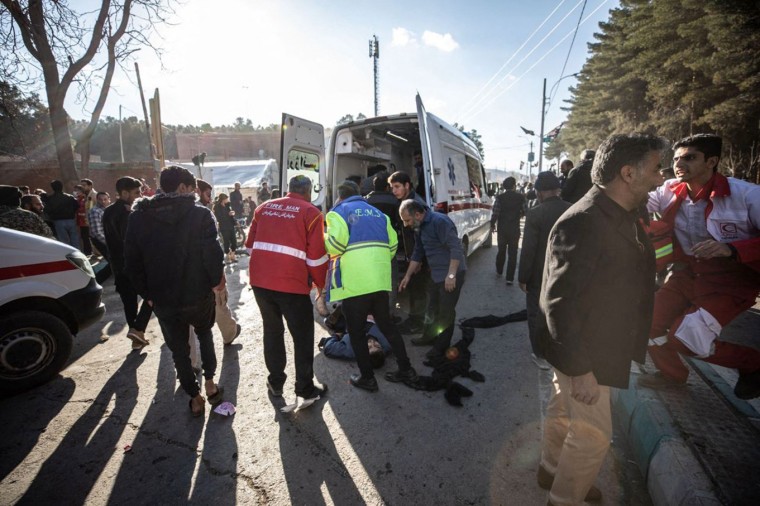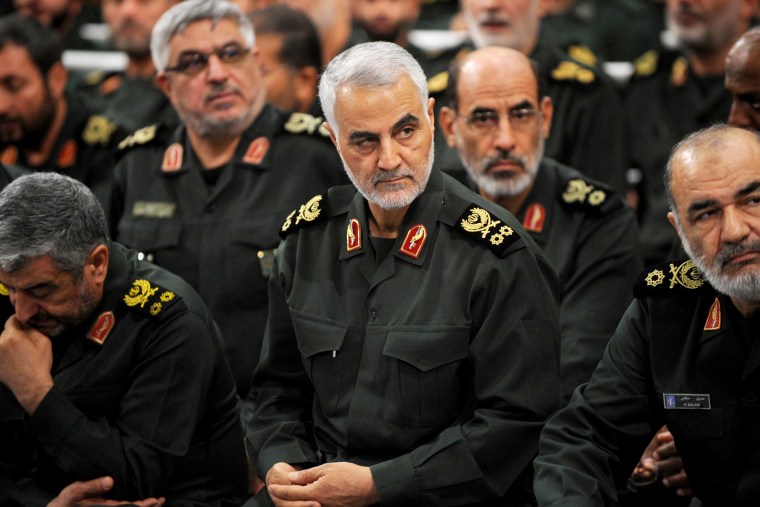Two explosions killed at least 95 people in southern Iran on Wednesday at a memorial event for a senior Iranian general killed in a 2020 U.S. drone strike, ramping up tensions in a region already on edge.
The first of two blasts hit around 2,300 feet from the tomb of Gen. Qassem Soleimani in the Kerman Martyrs Cemetery, the semiofficial news agency ISNA reported. It added that the second explosion was around 2,000 feet away.
No one immediately claimed responsibility for the blasts — which injured more than 210 and was one of the worst attacks in the Islamic Republic’s history.
An earlier death toll of around 100 people was revised after officials realized that some names were being counted twice, Iran’s health minister, Bahram Einollahi, told state TV.
Soleimani, who grew up in the city of Kerman, the regional capital of a province of the same name, was killed in Iraq’s capital, Baghdad.

At the time of his death, Soleimani was among the country’s most powerful men as the leader of Iran’s secretive Quds Force, part of the Revolutionary Guard, tasked with protecting and advancing his nation’s interests in countries such as Afghanistan, Iraq, Lebanon, Syria and the Palestinian territories.
Some Iranian officials were quick to denounce Wednesday’s explosions as “terrorist attacks,” but uncertainty surrounded the incident in a country where information is closely controlled by the ruling theocratic regime.
The semiofficial Fars news agency reported that three policemen were among the dead.
Rahman Jalali, Kerman’s deputy governor for security, told the state-run IRNA news agency that the explosions had been “carried out by terrorists.” The semiofficial Tasnim news agency said that the blasts were caused by two explosive-laden suitcases.
“The nation of Iran is in mourning and many families mourned the death their loved ones,” Ayatollah Ali Khamenei said. “The hard-hearted criminals could not tolerate the love and enthusiasm of the people to visit the shrine of their great commander Qassem Soleimani.” Khamenei did not call out the “criminals” by name in his statement to IRNA.
The U.S. does not believe Israel was behind the attack in Iran today, according to four current and former U.S. officials. The U.S. was also not responsible, two of the officials said.
Iranians have gathered at the cemetery to commemorate Soleimani each year since his death, which was directed by then-President Donald Trump and sparked angry protests in Iran and Iraq, with many calling for revenge on the United States.

It was unclear whether Wednesday’s blasts had any relation to the Israel-Hamas war, but they come at a time of heightened tensions across the Middle East.
The explosions follow the killing of Hamas leader Saleh al-Arouri in a reported drone strike in Beirut on Tuesday, a blast that fueled fears of broader regional escalation as Israel and others face off with Iran-backed groups.
Al-Arouri, the commander of Hamas’ military wing in the occupied West Bank and deputy chairman of the group’s political bureau, was a key figure who had helped repair Hamas’ relations with Iran. He had been in Israel’s crosshairs before the current conflict began.
Hamas and the Lebanese-based militant group Hezbollah laid blame for the strike on Israel. Israeli officials declined to comment.
Hamas on Wednesday issued a statement in response to the bombings in Iran, condemning what it called a “criminal attack in the city of Kerman.”
Israel has a history of hunting down its enemies, including Hamas leaders. It has been engaged in a “shadow war” with Tehran that has involved targeted assassinations and attacks against Iran’s nuclear program, but not mass casualty bombings.
Sunni extremist groups including the Islamic State terrorist group have conducted large-scale attacks in the past that killed civilians in Shia-majority Iran, though not in relatively peaceful Kerman.
Mass protests in recent years, including those over the death of 22-year-old Mahsa Amini in 2022, have rocked Iran, and the country also has been targeted by exiled groups in attacks dating to the turmoil surrounding its 1979 Islamic Revolution.






